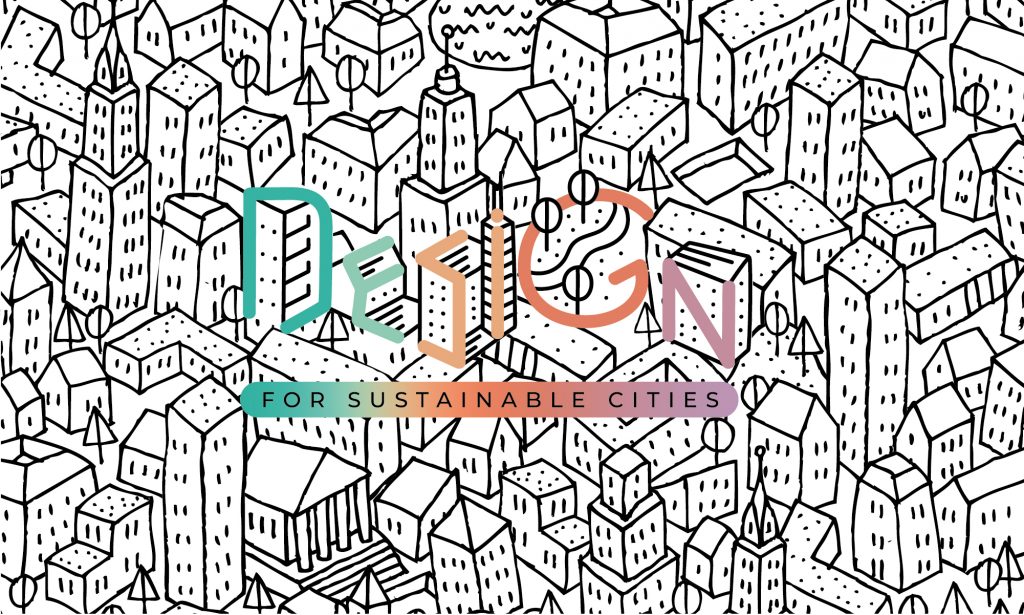“Design for Sustainable Cities” is an international student competition, being held by BE OPEN and Cumulus. It is open to students and graduates of all art, design, architecture and media disciplines of universities and colleges worldwide. The competition aims to encourage creation of innovative solutions, by younger creatives, for more sustainable cities.

The focus of the competition is the United Nations’ SDG11: Sustainable Cities and Communities. According to UN data, 2007 marked the shift to an urban world, with more than half of the world’s population now living in urban settings, cities and communities, and urban inhabitation is projected to rise to 60% by 2030. Cities and metropolitan areas are powerhouses of economic growth. However, this growth goes hand in hand with increased carbon emissions and escalating resource consumption.
Consequences of rapid urbanization are evident in growing number of slum dwellers, lack of decent and affordable housing, unplanned urban sprawl, inadequate and overburdened infrastructure and services (such as water and sanitation systems, waste collection, communication systems, energy sources, road and transport infrastructure, food supply chains), worsening air quality and access to clean water.
The UN Sustainable Development Goals are a direct response to the consequences of urbanization, with SDG11: Sustainable Cities and Communities putting particular focus on urban settlements. However, all 17 UN SDG’s are relevant when addressing urban sustainability.
To attain the UN SDGs we need to think out of box the goals. We need creative thinking – design thinking – and creative action. Design has a crucial role to play as an instrument or vehicle for the implementation of the UN SDGs.
BE OPEN and Cumulus, and all of the stakeholders involved in this international competition programme, strongly believe that creativity is integral in the shift to sustainable existence.
The objective of ‘Design for Sustainable Cities’ is to recognize, showcase and promote the best design ideas and projects that embody and can advance the principles, aims and implementation of United Nations’ Sustainable Development Goals.
Cities are burdened with many challenges in terms of sustainability. But we cannot turn our backs on the urban age. Cities are also the base for more sustainable approaches and solutions. When we speak of sustainability this encompasses environmental, economic and social sustainability. And all important is a human-centric focus.
The solutions to support Design for Sustainable Cities SDG11 Sustainable Cities and Communities must relate to one or more of the following three submission categories corresponding to three urban themes:
- Co-created Cities:
The city is humankind’s greatest collective work of creativity. As such the city is co-creation par excellence. We come together in cities to meet, greet, exchange and co-create. Cities are all important as fora for critical mass of critical thinking and tangible solutions. As our urban challenges increase, we need to do our utmost to enhance and innovate how we interact, both in the physical and virtual world. We can go further in creating sustainable cities if we do so collectively. Collective action can better offer and accelerate value. Co-creation is the path to collective impact.
- Sharing Cities:
The city is based on co-existence, shared resources, on shared space, shared thinking, shared respect. The sharing city goes beyond pure consumption. The sharing city is a city and society seeking to optimize resources, making the most of recycling, repurposing, retrofit, reuse of resources. The sharing city is regenerative. The sharing city is inclusive, striving to make room for everybody, striving for urban ecologies, striving for healthy balances between humankind, built environments and natural environments. The sharing city is the caring city. The sharing city is also about sharing the intangible, sharing cultures, sharing insight and knowhow, sharing responsibilities, sharing blood, sweat and tears, sharing celebrations, sharing experiences happy, sad and sublime, sharing creative forces. This includes sharing designs. This is embracing open source. We are better when we do things together.
- Safe and Sound Cities:
Safety, security, health and well-being are at the crux of urban co-existence. The greatest individual concern is health and well-being. The greatest collective urban concern is public health and welfare. First and foremost, access to clean air and provision fresh water (ref. access to fresh water is the Achilles heel of any and every city and settlement). There next food and shelter are vital for a sound city. Any infringement on our health and security directly impacts our levels of happiness and well-being. Our sense of security is certainly being put to the test with current COVID-19 worldwide health crisis. Some are turning their backs on cities, seeing cities as problematic places to be. But urban density is not necessarily to blame for the pandemic. We confuse social distancing with physical distancing. We need to be creative about how to be together apart, how to sustain and foster social interaction while maintaining safe distance. We need to adapt and adopt pre-cautionary practices so that we can safely co-exist in meaningful ways.
Solutions for safe and sound cities are more important than ever! To highlight this urgency, this competition includes the Safe City Prize. By setting this prize the organizers encourage the participants to develop their projects with the pandemic in mind, and aim to relieve urban existence in this situation.
‘Design for Sustainable Cities’ is a chance for the next generation of committed designers in to be recognized on an international stage. Students may enter as individuals or as part of a multidisciplinary team, and the competition will reward the best works with different categories of prizes as well as travel grants and certificates.
The Main prize of €5,000, as well as Safe City prize of €2,000 will be awarded by the Jury, who will also select 50 honourable mentions. The Founder’s Choice prize of €3,000 is allocated by the Founder of BE OPEN Elena Baturina who will select the awardee out of 50 honourable mentions. Additionally, the winner of the Public Vote prize of €2,000 will be decided upon by the majority of votes in an online open vote from 50 honorary mentions.
Winners in all prize categories will be expected to attend a live awards ceremony that will take place during the Cumulus Conference Roma 2021: Design Culture(s) at Sapienza University of Rome in June 2021.
In addition, winners and 50 honorary mentions will be highlighted in BE OPEN, Cumulus and competition websites and publicised via the partners’ social media platforms, gaining many opportunities to see their designs showcased to a worldwide audience.
“Design for Sustainable Cities” is now open for online submissions. The winning submissions will be unveiled by April 2021.
